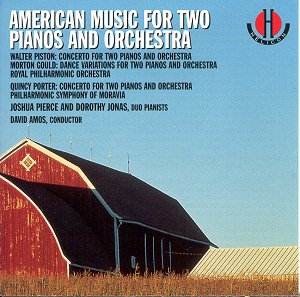Part of this disc has been available in the U.K. before
on a Koch release, 3-7002-2. The conductor, David Amos has been
relatively busy over the years recording out of the way American
orchestral music. He has done sterling service in bringing these
to our attention. Are there any masterpieces here? I donít think
so, but what we have is a trio of reasonably tuneful concerti for
two pianos by three contemporary American composers who have been
prominent over the years.
All three works on this disc are played by the
piano duo of Joshua Pierce and Dorothy Jonas. They are a duo which
has been active on the American circuit for a number of years.
Both soloists are ex-students of the Juilliard School of Music.
Both have independent concert soloist careers but have appeared
as a duo in many American venues to great acclaim. There is certainly
no problem whatsoever with their performances of all three works
on this disc.
Walter Piston is probably the most famous of
this trio and his Concerto for Two Pianos was commissioned by
and dedicated to Melvin Stecher and Norman Horowitz. It is an
example of his well written and orchestrated works, without perhaps
the impact of some of his more famous compositions e.g. the 2nd
and 6th Symphonies. The catalogue could do with much
more Piston, and although not out of his top drawer this is a
welcome addition to the current lists. It is in three movements
and was inspired by the sound and drive of the Concerto Grosso.
It is both tuneful and easy to listen to.
Morton Gould, on the other hand is probably the
most generally well known of this trio of composers as much of
his output is in the semi-popular field. His Dance Variations
is an example of his populist writing combining as it does, the
sounds of classical, jazz and popular music. These Variations
exhibit a number of styles, e.g. Gavotte, Pavane, Polka, Quadrille,
Minuet, Waltz and Can-can, Pas de Deux, Tango and Tarantella.
Bringing all of these into a work lasting only 24 minutes is some
feat. However, if you know Gouldís style of writing, I think you
will know what to expect. The two soloists enjoy themselves hugely.
Quincy Porterís Concerto for Two Pianos is in
a somewhat less boisterous style than the Gould, or even indeed,
the Piston. Commissioned by the Louisville Orchestra, the concerto
was written whilst the composer was on sabbatical leave from Yale,
and living in Florence. When it received its first performance
in Louisville in 1954, it was nominated for, and subsequently
won, the prestigious Pulitzer Prize in music. It is in one movement,
with the allegro middle section occupying almost half the concertoís
length. This concerto is generally considered to be Porterís finest
work, and it is good to have it in the catalogue in such a very
good performance. The Moravian orchestra certainly does not sound
out of character in this very American flavoured work, leaving
me to wonder whether this Moravia is in the U.S.A. Highly recommended.
John Phillips
